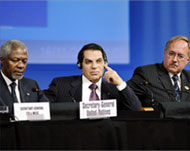Rift averted at Tunis internet summit
An eleventh-hour deal has avoided a potentially damaging split between the United States and the rest of the world over control of the internet after diplomats agreed to work towards enhanced international cooperation.

Negotiators struck an agreement on key clauses on internet governance for endorsement during the World Summit on the Internet Society, which began in Tunis on Wednesday.
But the deal late Tuesday left intact single-handed US control over the private body that oversees the key technical and administrative roots of the global network, despite the challenges contributing to a three-year deadlock.
Officials had warned that the internet could have been torn into competing or disconnected networks if the split had continued.
The agreement set up two parallel tracks of multilateral talks, including an open-ended process “towards enhanced cooperation (by) relevant international organisations” on oversight and public policy issues.
No target set
The new process will be triggered by UN Secretary-General Kofi Annan in the first quarter of 2006, according to the final draft, but it set no target for an outcome.
Despite sharp criticism, the private, non-profit, Internet Corporation for Assigned Names and Numbers (ICANN) was expected to have its tender renewed by the US government next summer.
 |
|
Some 50 government leaders |
The accord “preserved the unique role of the US government in ensuring the reliability and stability of the Internet”, top US negotiator David Gross said on Wednesday.
“It took no action with regard to existing institutions including ICANN. It created no new international organisations,” added Gross, the US coordinator for international communications and information policy.
Countries such as Iran and China had sought UN oversight of ICANN or internet governance, while the European Union wanted to water down US powers, but Washington firmly objected.
The other track creates an Internet Governance Forum (IGF) for an initial five-year term to hold talks on all internet issues, including problems such as as spam, cyber crime and computer viruses.
Efforts applauded
After a final session which saw US, Chinese and Iranian diplomats swapping suggestions for new wording, officials applauded efforts to widen the scope of formal discussion to industry and civil society.
The IGF, which Greece has offered to host, will also be allowed to “build on the existing structures of internet governance” but has no concrete powers.
 |
|
Kofi Annan and Tunisia president |
“The worst has been avoided, but we’re not sure that the best is to come in the future. We have left a door open,” said Bernard Benhamou, a member of the French delegation.
“We are satisfied there has been progress and a roadmap,” French Industry Minister Francois Loos said on Wednesday, adding that it was not a major leap forward.
UN Under Secretary-General for Communications Shashi Tharoor said an agreement on Internet governance was “crucial” to continue to build on freedom of expression on the global process.
“We need more voices in the process and we need more voices on the net,” Tharoor said.
Decision welcomed
Business groups at the summit said they were ready to take part in the forum.
In a statement, a coordinating body close to the International Chamber of Commerce also welcomed “the continued commitment to the private sector-led technical management of the internet”.
Washington’s critics had warned that no single nation could maintain control over top-level domain or country names – such as .cn, .fr and .uk – without the threat of their being misused to block a foe’s access to the Internet for political or economic reasons.
The US retorted that regimes that do not allow freedom of speech might instead be in a position to have leverage over the internet.